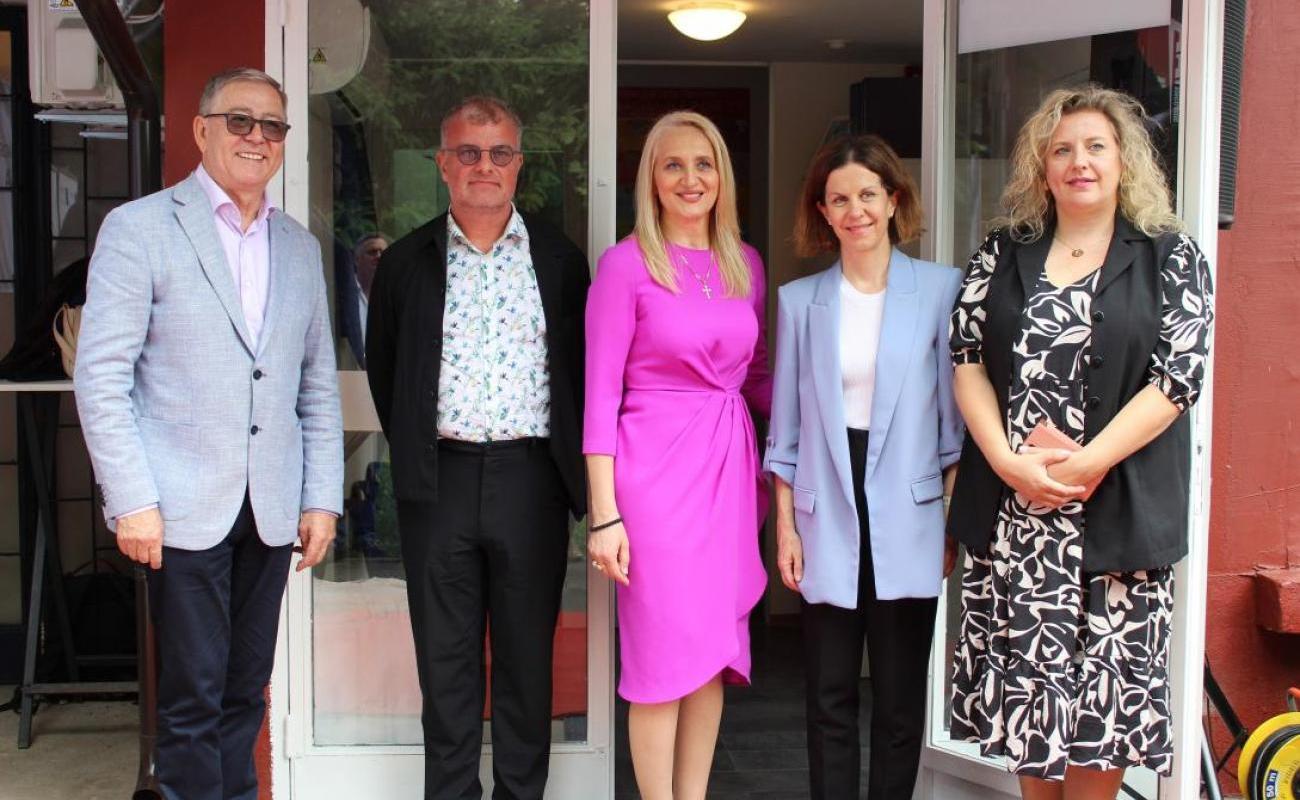Early Childhood Development Centre opened in Banja Luka thanks to EU support

A new Early Childhood Development (ECD) Centre, financed with EU support, was officially opened today at the Starčevica Ambulanta Primary Healthcare Centre in Banja Luka. The new ECD Centre will provide early detection and early intervention services for children aged 0–6, delivered by a multidisciplinary team including psychologists, child psychiatrists, speech therapists, defectologists, and nurses. These services will be supported through intersectoral collaboration across health, education, and social welfare sectors.
The opening ceremony was attended Mr. Karel Lizerot, Head of the Section for Justice and Home Affairs, Migration, and Public Administration Reform at the EU Delegation to BiH, Ms. Alexandra Illmer, Deputy Representative, UNICEF BiH, Mr. Milan Latinović, Assistant Minister of Health and Social Welfare of Republika Srpska, Ms. Nevena Todorović, General Manager, Primary Health Care Center Banja Luka and Ms. Milada Šukalo, Advisor to the Mayor of the City of Banja Luka.
“Early detection and intervention can make a real difference in the lives of children, as well as their parents, and the new Early Childhood Development Centre in Banja Luka represents an important step forward in providing children with a safe, nurturing environment where their needs can be addressed. The European Union is committed to further strengthening preventive and primary health care across Bosnia and Herzegovina. In the coming months we will open more centres across the country. We are proud to partner with UNICEF and local authorities to ensure that all children, especially the most vulnerable, have access to quality health services”, said Lizerot.
The ECD Centre in Banja Luka was opened as part of the broader “EU Support to the Health Sector Reform in Bosnia and Herzegovina” project, funded by the European Union with EUR 7.2 million to improve health sector reform in Bosnia and Herzegovina. Implemented by UNICEF Bosnia and Herzegovina in partnership with local authorities, the project aims to build a resilient, people-cantered primary health care system that ensures equitable access to quality services for all. ECD Centres will soon be opened in health centres in Prijedor, Bijeljina and Doboj, and have already been opened in Vogošća and Saraj Polje. The network of ECDs across Bosnia and Herzegovina strengthens early detection and intervention services, ensuring more children receive quality support during crucial developmental stages, contributing to a healthier and more inclusive future for all families.
In addition to the centers in Republika Srpska, the European Union is also funding the establishment of Early Childhood Development Centers across the Federation of BiH. Two centers have already opened in Federation of BiH, with two centers already opened in Vogošća and Saraj Polje in 2024, supporting early identification of children at risk of developmental difficulties and providing vital early intervention services.
"Through the plans and activities outlined in the Early Childhood Development Programme of Republika Srpska for the period 2022–2028, the Ministry of Health and Social Welfare of Republika Srpska remains committed to supporting health institutions, social welfare institutions, preschool and school education systems, parents, partners, and the media in implementing a holistic and integrated early childhood development system. This Center in Starčevica—a Banja Luka neighborhood with the highest number of young families and small children—is another important link in the network of Early Childhood Development Centers across Republika Srpska, providing timely detection and early intervention services for children in their early years," said Milan Latinović, Assistant Minister of Health and Social Welfare of Republika Srpska.
This initiative builds on the legacy of the project “Enhancing the Social Protection and Inclusion Systems for Children in Bosnia and Herzegovina” (2008–2014), funded by the EU, Government of Norway, and DfID. That project laid the foundation for the first ECD policies and centres in the country, catalysing reforms that continue to benefit children today.
UNICEF has been a steadfast partner in this journey, supporting the development of policies, strategies, and action plans, and helping 56 municipalities across BiH establish sustainable, integrated ECD services. UNICEF also continues to invest in capacity building for professionals to ensure high-quality, nurturing care for every child.
“Evidence shows that quality early childhood interventions lead to healthier lives, better educational outcomes, and stronger societies, with recent analyses in Republika Srpska revealing that every 1 BAM invested in ECD yields up to 4 BAM in socio-economic benefits, while the cost of inaction could reach 103 million BAM. The services offered here—early detection, developmental support, and family counseling—are vital for identifying and addressing challenges early, ensuring children can thrive. This center builds on years of collaboration and policy development, integrating health, education, and social welfare to provide holistic care for children aged 0 to 6. With trained professionals and a robust intersectoral referral system, we are ensuring that no child is left behind. UNICEF remains committed to supporting sustainable ECD services across BiH”, said UNICEF Deputy Representative, Alexandra Ilmer.
As emphasised during the ceremony, children are the future, and investing in their early development is essential for achieving long-term social and economic progress. The ECD Center in Banja Luka is a testament to what can be achieved through strong partnerships, shared vision, and commitment to the well-being of every child.
